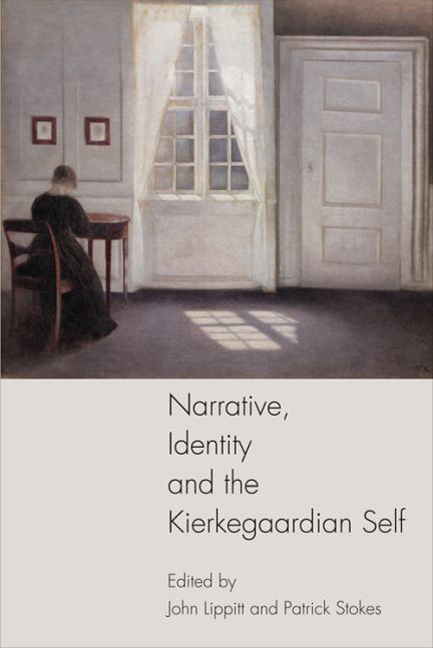Book contents
- Frontmatter
- Contents
- Acknowledgements
- Abbreviations
- Contributors
- Introduction
- 1 The Moments of a Life: On Some Similarities between Life and Literature
- 2 Teleology, Narrative and Death
- 3 Kierkegaard's Platonic Teleology
- 4 Narrative Holism and the Moment
- 5 Kierkegaard's Erotic Reduction and the Problem of Founding the Self
- 6 Narrativity and Normativity
- 7 The End in the Beginning: Eschatology in Kierkegaard's Literary Criticism
- 8 Forgiveness and the Rat Man: Kierkegaard, ‘Narrative Unity’ and ‘Wholeheartedness’ Revisited
- 9 The Virtues of Ambivalence: Wholeheartedness as Existential Telos and the Unwillable Completion of Narravives
- 10 Non-Narrative Protestant Goods: Protestant Ethics and Kierkegaardian Selfhood
- 11 Narrativity, Aspect and Selfhood
- 12 The Senses of an Ending
- 13 The End? Kierkegaard's Death and its Implications for Telling his Story
- Bibliography
- Index
1 - The Moments of a Life: On Some Similarities between Life and Literature
Published online by Cambridge University Press: 15 September 2017
- Frontmatter
- Contents
- Acknowledgements
- Abbreviations
- Contributors
- Introduction
- 1 The Moments of a Life: On Some Similarities between Life and Literature
- 2 Teleology, Narrative and Death
- 3 Kierkegaard's Platonic Teleology
- 4 Narrative Holism and the Moment
- 5 Kierkegaard's Erotic Reduction and the Problem of Founding the Self
- 6 Narrativity and Normativity
- 7 The End in the Beginning: Eschatology in Kierkegaard's Literary Criticism
- 8 Forgiveness and the Rat Man: Kierkegaard, ‘Narrative Unity’ and ‘Wholeheartedness’ Revisited
- 9 The Virtues of Ambivalence: Wholeheartedness as Existential Telos and the Unwillable Completion of Narravives
- 10 Non-Narrative Protestant Goods: Protestant Ethics and Kierkegaardian Selfhood
- 11 Narrativity, Aspect and Selfhood
- 12 The Senses of an Ending
- 13 The End? Kierkegaard's Death and its Implications for Telling his Story
- Bibliography
- Index
Summary
Over the past several decades narrative accounts of personal identity have become increasingly popular (see, e.g. Davenport 2012, MacIntyre 1984, Ricoeur 1992, Rudd 2012, Schechtman 1996, Taylor 1989). As the narrative approach has become more prominent it has, predictably, attracted its share of criticism, and there has been a fairly strong reaction against the idea that our lives can profitably be understood in narrative terms. The most common and forceful objection to this approach is often formulated as a kind of dilemma: either narrative theories really mean to claim that our lives are significantly like literary narratives or these views use the term ‘narrative’ in some weaker and non-canonical sense. If the former is the case, the argument goes, the view is false and potentially damaging. If the latter is the case, the force of describing our lives in terms of ‘narrative’ is unclear and the view is in danger of triviality.
In this essay I offer a response to this dilemma on behalf of a version of the narrative approach which I call the ‘narrative self-constitution view’ and which I developed in The Constitution of Selves (Schechtman 1996). I begin with an overview of the narrative self-constitution view and the objections raised by ‘anti-narrativists’ before going on to answer these charges in more detail, speaking first to the charge that the view is false and then to the charge that it is harmful before concluding with a brief discussion of why the view of narrative employed should be considered non-trivial.
THE NARRATIVE SELF-CONSTITUTION VIEW: BACKGROUND AND OBJECTIONS
Before seeing how the narrative self-constitution view is able to respond to the dilemma described above we will need a few more details about the view itself as well as a clearer understanding of the objection to it. The narrative self-constitution view is developed as a way of expressing Locke's basic insights about the nature of personal identity, and presented as an alternative to the expression of these insights found in traditional psychological continuity theories. Locke famously argues that personal identity over time consists in sameness of consciousness rather than sameness of substance.
- Type
- Chapter
- Information
- Narrative, Identity and the Kierkegaardian Self , pp. 11 - 28Publisher: Edinburgh University PressPrint publication year: 2015



